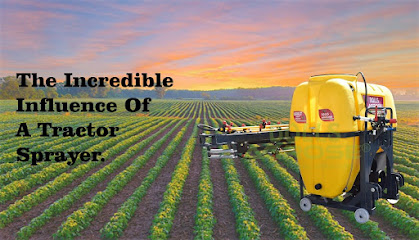The Incredible Influence of a Tractor Sprayer
A tractor sprayer is a type of agricultural machinery used to spray liquid fertilisers, pesticides, and herbicides on crops. A large tank holding the chemical solution, a pump to pressurise the solution, and a spray boom with nozzles mounted on a tractor's back make up the system. In order to change the width and coverage of the spray pattern, a tractor sprayer's boom can be divided into sections that can each be individually controlled. This prevents chemical waste and damage to neighbouring plants while enabling the operator to apply chemicals to the target area precisely and accurately.
The most crucial crop production practices are those related to plant protection, using the sprayer to apply the most pesticide products possible. In agriculture, one of the most frequent and important tasks is the application of fungicides, herbicides, and insecticides. The conflict between economic expansion and environmental protection in agricultural production has been caused by traditional agricultural spraying methods. In recent decades, spraying techniques have continuously improved. Not only is a sprayer necessary for pesticide application, but other factors like the type and size of the plant canopy, the area of a plant leaf, the crop's height, and the number of plants being applied are also crucial for better outcomes.
Advantages of tractor sprayers
1) Efficiency gain: Tractor sprayers can quickly and effectively cover large areas, which saves time and labour during spraying operations.
2) Application accuracy: Tractor sprayers come with a spray boom that can be adjusted to precisely and accurately deliver chemicals to defined areas, minimising waste and maximising effectiveness.
3) Versatility: Tractor sprayers can be used for a wide range of tasks, such as the application of fertiliser, pesticides, and even water for irrigation.
4) Cost-effectiveness: Due to their efficiency and accuracy, tractor sprayers are frequently more cost-effective than alternative chemical application techniques like aerial spraying or manual application.
5) Reduced environmental impact: Careful application reduces chemical waste and the effects of chemicals on the environment, including the quality of the soil and water.
6) Mobility: Because tractor sprayers are portable, farmers can quickly and effectively apply chemicals to various parts of their crops as needed.
How does the tractor spray operate?
1) Fill the tank: The liquid chemical solution that will be sprayed on the crops is put into the tractor sprayer tank.
2) Solution pressurisation: The tank's solution is pressurised using a pump. Under this pressure, the solution must be forced through the spray nozzles in order to produce a fine spray mist.
3) Adjust the spray boom: To achieve the desired spray pattern, the spray boom is adjusted to the desired height and width, and any necessary nozzle adjustments are made.
4) Start spraying: As the tractor operator moves the sprayer over the field, the spray nozzles are turned on to start applying the chemical solution to the crops.
5) Continue spraying: Spraying continues as the tractor and sprayer are driven across the field until the entire area has been sprayed.
6) Rinse the system: To ensure that no chemical residue is left in the system after spraying is finished, the sprayer system should be thoroughly rinsed.
How is a tractor-sprayer maintained?
1) Clean the sprayer after each use: Each time you use the sprayer, clean it. After every use, rinse the sprayer tank and nozzles with clean water to avoid chemical buildup and clogging. Additionally, use water to clean the hoses and pump.
2) Regularly inspect the sprayer: Examine the sprayer on a regular basis for any indications of damage, such as leaks, cracks, or worn-out components. Any damaged parts must be replaced right away.
3) Check and replace filters: To prevent clogs and guarantee proper flow, regularly inspect and clean the sprayer's filters. When necessary, swap out the filters.
4) Lubricate moving parts: To ensure smooth operation and prevent rust and corrosion, lubricate moving parts like the pump, valves, and spray booms.
5) Store the sprayer properly: In order to protect it from the elements and avoid rust and corrosion, store the sprayer in a tidy, dry, and covered area.
6) Follow the manufacturer's instructions: Adhere to the manufacturer's maintenance guidelines, which include suggested maintenance intervals and techniques.
7) Have a professional service the sprayer: To make sure the sprayer is operating properly and to identify any potential issues before they become significant issues, have it serviced by a professional at least once per year.
Conclusion
Finally, a tractor sprayer is a crucial piece of equipment for farmers and other agricultural workers. It is a very effective and adaptable piece of machinery that enables precise and accurate chemical application to crops, improving crop yields, lowering costs, and having little negative environmental impact. A tractor sprayer needs routine maintenance to function properly and last a long time. Farmers can make sure that their tractor sprayer is in good working order and available for use when needed by adhering to the manufacturer's instructions and carrying out routine inspections and maintenance. An investment in a tractor sprayer is worthwhile for any agricultural operation due to its many advantages and benefits.
Dolls Export Pvt. Ltd. has received numerous accolades for being a trusted name in the production of agricultural products like Argo Chemicals, bio-fertilizers, and sprayers. We provide a wide selection of agricultural sprayers. Particularly, tractor sprayers, tractor mounted sprayers, boom sprayers, turbo atomizer sprayers, air misters, tractor-trailer sprayers, roller-mounted sprayers, air blast sprayers, mounted high pressure sprayers, orchid sprayers, vineyard sprayers, and field sprayers. European Standards are met by the high quality of our sprayers. You may feel free to contact us in case of any query.

Comments
Post a Comment